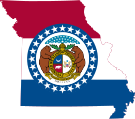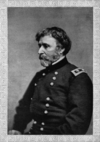.mw-parser-output .module-shortcutboxplain{float:right;border:1px solid #aaa;background:#fff;margin:0 0 0 1em;padding:.3em .6em .2em .6em;text-align:center;font-size:85%;font-weight:bold}.mw-parser-output .module-shortcutlist{display:inline-block;border-bottom:1px solid #aaa;margin-bottom:.2em;font-weight:normal}.mw-parser-output .module-shortcutanchordiv{position:relative;top:-3em}
Missouri ( ( listen) or ) is a U.S. state located in the Midwestern United States, bordered by Iowa, Illinois, Kentucky, Tennessee, Arkansas, Oklahoma, Kansas and Nebraska. With a 2009 estimated population of 5,987,580, Missouri is the 18th most populous state in the nation and the fifth most populous in the Midwest. It comprises 114 counties and one independent city. Missouri's capital is Jefferson City. The four largest urban areas are St. Louis, Kansas City, Springfield, and Columbia. Missouri was originally acquired from France as part of the Louisiana Purchase and became defined as the Missouri Territory. Part of the Missouri Territory was admitted into the union as the 24th state on August 10, 1821. listen) or ) is a U.S. state located in the Midwestern United States, bordered by Iowa, Illinois, Kentucky, Tennessee, Arkansas, Oklahoma, Kansas and Nebraska. With a 2009 estimated population of 5,987,580, Missouri is the 18th most populous state in the nation and the fifth most populous in the Midwest. It comprises 114 counties and one independent city. Missouri's capital is Jefferson City. The four largest urban areas are St. Louis, Kansas City, Springfield, and Columbia. Missouri was originally acquired from France as part of the Louisiana Purchase and became defined as the Missouri Territory. Part of the Missouri Territory was admitted into the union as the 24th state on August 10, 1821.
 Missouri mirrors the demographic, economic and political makeup of the nation with a mix of urban and rural culture. It has long been considered a political bellwether state. With the exceptions of 1956 and 2008, Missouri's results in U.S. presidential elections have accurately predicted the next President of the United States in every election since 1904. It has both Midwestern and Southern cultural influences, reflecting its history as a border state. It is also a transition between the Eastern and Western United States, as St. Louis is often called the "western-most Eastern city" and Kansas City the "eastern-most Western city." Missouri's geography is highly varied. The northern part of the state lies in dissected till plains while the southern part lies in the Ozark Mountains (a dissected plateau), with the Missouri River dividing the two. The confluence of the Mississippi and Missouri rivers is located near St. Louis.
Read more ...
Show more selections
The Frémont Emancipation was part of a military proclamation issued by Major General John C. Frémont (1813 – 1890) on August 30, 1861 in St. Louis, Missouri during the early months of the American Civil War. The proclamation placed the state of Missouri under martial law and decreed that all property of those bearing arms in rebellion would be confiscated, including slaves, and that confiscated slaves would subsequently be declared free. It also imposed capital punishment for those in rebellion against the federal government.
For President Abraham Lincoln the proclamation created a difficult situation, as he tried to balance the agendas of Radical Republicans who favored abolition and slave-holding Unionists in the American border states whose support was essential in keeping the states of Missouri, Kentucky and Maryland in the Union.
Nationwide reaction to the proclamation was mixed. Abolitionists enthusiastically supported the measure while conservatives demanded Frémont's removal. Seeking to reverse Frémont's actions and maintain political balance, Lincoln eventually ordered Frémont to rescind the edict on September 11, 1861. Lincoln then sent various government officials to Missouri to build a case for Frémont's removal founded on Frémont's alleged incompetence rather than his abolitionist views. On these grounds, Lincoln sent an order on October 22, 1861, removing Frémont from command of the Department of the West. Although Lincoln opposed Frémont's method of emancipation, the episode had a significant impact Lincoln, shaping his opinions on the appropriate steps towards emancipation and eventually leading to Lincoln's own Emancipation Proclamation.
The Japanese Garden in the Missouri Botanical Garden, St. Louis, Missouri.
Wikinews Missouri portal
- US government to investigate paramilitary policing
- Wikinews interviews former Matilda's player Sarah Walsh about Australian women's soccer
- Wikinews interviews American zoologists about pirate perches' chemical camouflage
- Supreme Court of the United States contemplates same-sex marriage
- United States re-elects Barack Obama
- Singer Andy Williams dies at 84
- Pressure mounts on US Senate candidate Todd Akin to withdraw after controversial rape comments
- Albert Pujols ends his worst homerun drought
- St. Louis storm uproots tent; one dead, several injured
- Deadly tornadoes blast U.S. Midwest leaving 39 dead
Gerty Theresa Cori (née Radnitz, August 15, 1896 – October 26, 1957) was an American biochemist who became the third woman—and first American woman—to win a Nobel Prize in science, and the first woman to be awarded the Nobel Prize in Physiology or Medicine.
Cori was born in Prague (then in the Austrian Empire, now the Czech Republic). Growing up at a time when women were marginalized in science and allowed few educational opportunities, she gained admittance to medical school, where she met her future husband Carl Ferdinand Cori; upon their graduation in 1920, they married. Because of deteriorating conditions in Europe, the couple immigrated to the United States in 1922. Gerty Cori continued her early interest in medical research, collaborating in the laboratory with Carl. She published research findings coauthored with her husband, as well as publishing singly. Unlike her husband, she had difficulty securing research positions, and the ones she obtained provided meager pay. Her husband insisted on continuing their collaboration, though he was discourage from doing so by the institutions that employed him.
With her husband Carl and Argentine physiologist Bernardo Houssay, Gerty Cori received the Nobel Prize in 1947 for the discovery of the mechanism by which glycogen—a derivative of glucose—is broken down in muscle tissue into lactic acid and then resynthesized in the body and stored as source of energy (known as the Cori cycle). They also identified the important catalyzing compound, the Cori ester. In 2004, both Gerty and Carl Cori were designated an ACS National Historical Chemical Landmark in recognition of their work in clarifying carbohydrate metabolism.

- ... that architect Frank Lloyd Wright called St. Louis, Missouri's Wainwright Building, built by Ellis Wainwright in 1890–92, "the very first human expression of a tall steel office-building as Architecture"?
- ... that German-born U.S. soldier Christian Steiner was one of 32 soldiers who received the Medal of Honor for battling against Cochise and the Apache Indians in the Chiricahua Mountains in 1869?
- ... that, while on location in Alaska shooting the 1933 film Eskimo, Academy Award winner Clyde De Vinna was rescued from carbon monoxide poisoning because he was using his short wave radio?
- ... that Daniel Page, the second mayor of St. Louis, Missouri, helped finance the construction of the Ohio and Mississippi Railroad?
- ... that Edgar Buchanan, probably best remembered as Uncle Joe Carson from the Petticoat Junction and Green Acres television sitcoms of the 1960s, was a dentist before becoming an actor?
- ... that, in 1930, Elm Farm Ollie became the first cow to be milked while flying in an airplane?
Select [+] to view subcategories
▼ Missouri
► Categories by city in Missouri
► Buildings and structures in Missouri
► Communications in Missouri
► Demographics of Missouri
► Environment of Missouri
► Missing person cases in Missouri
► Native American tribes in Missouri
► Professional wrestling in Missouri
► Science and technology in Missouri
► Tourist attractions in Missouri
► Transportation in Missouri
► Wikipedia books on Missouri

|
Here are some tasks awaiting attention:
Assess : Assess these articles
Cleanup : clean-up listing for Missouri
Expand : Springfield, Missouri, Independence, Missouri, Missouri State Capitol
Infobox : Add {{infobox city}} to all articles in List of cities in Missouri
Maintain : All featured articles, featured lists, and good articles
Orphans : Orphaned articles in Missouri
Photo : Take a picture of the items requested here.
Stubs : Destub these articles
Update : List of radio stations in Missouri, List of television stations in Missouri, List of newspapers in Missouri, List of Missouri rivers, List of people from Missouri
Other : Bring Columbia, Missouri, Kansas City, Missouri up to featured article status
|
State of MissouriJefferson City (capital)
Topics: Government • Geography • Transportation • History • People • Education • Tourist Attractions
Regions: Bootheel • Crowley's Ridge • Dissected Till Plains • Four State Area • Henry Shaw Ozark Corridor • Honey Lands • Lead Belt • Lincoln Hills • Little Dixie • Loess Hills • Mid-Missouri • Mississippi Embayment • Missouri Rhineland • Northern Plains • Osage Plains • Ozark Plateau • Platte Purchase • Pony Express • St. Francois Mountains • Westplex
Metro areas: Columbia • Jefferson City • Joplin • Kansas City • Springfield • St. Joseph • St. Louis
Largest cities: Kansas City • St. Louis • Springfield • Columbia • Independence • Lee's Summit • O'Fallon • St. Joseph • St. Charles • St. Peters • Blue Springs • Florissant • Joplin • Chesterfield • Jefferson City • Cape Girardeau • University City • Wildwood • Ballwin • Liberty • Raytown • Gladstone • Kirkwood • Maryland Heights • Hazelwood
|
Counties and Independent Cities: Adair • Andrew • Atchison • Audrain • Barry • Barton • Bates • Benton • Bollinger • Boone • Buchanan • Butler • Caldwell • Callaway • Camden • Cape Girardeau • Carroll • Carter • Cass • Cedar • Chariton • Christian • Clark • Clay • Clinton • Cole • Cooper • Crawford • Dade • Dallas • Daviess • DeKalb • Dent • Douglas • Dunklin • Franklin • Gasconade • Gentry • Greene • Grundy • Harrison • Henry • Hickory • Holt • Howard • Howell • Iron • Jackson • Jasper • Jefferson • Johnson • Knox • Laclede • Lafayette • Lawrence • Lewis • Lincoln • Linn • Livingston • Macon • Madison • Maries • Marion • McDonald • Mercer • Miller • Mississippi • Moniteau • Monroe • Montgomery • Morgan • New Madrid • Newton • Nodaway • Oregon • Osage • Ozark • Pemiscot • Perry • Pettis • Phelps • Pike • Platte • Polk • Pulaski • Putnam • Ralls • Randolph • Ray • Reynolds • Ripley • St. Charles • St. Clair • St. Francois • St. Louis (City) • St. Louis (County) • Ste. Genevieve • Saline • Schuyler • Scotland • Scott • Shannon • Shelby • Stoddard • Stone • Sullivan • Taney • Texas • Vernon • Warren • Washington • Wayne • Webster • Worth • Wright
|
The following Wikimedia Foundation sister projects provide more on this subject:
Wikiversity
Learning resources
- What are portals?
- List of portals
Purge page cache
|
|











 Clash Royale CLAN TAG
Clash Royale CLAN TAG